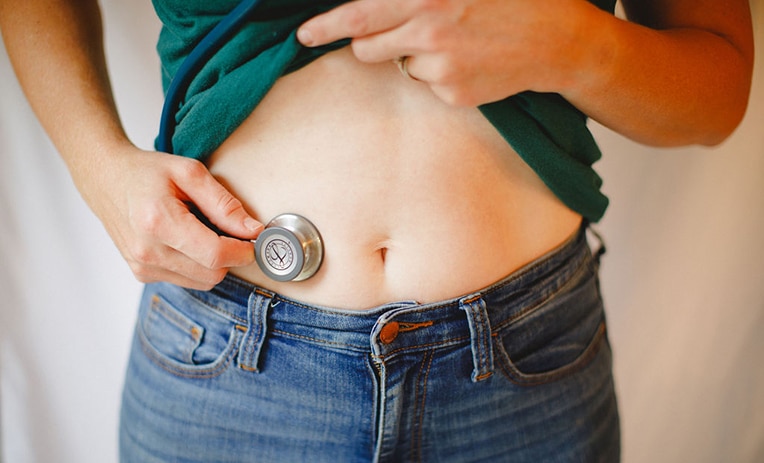Tell someone that you’re on “the pill,” and the chances are they won’t bat an eyelash. After all, approximately 150 million women worldwide use birth control pills and have been using them since the 1950s.1

Birth control pills aren’t just to prevent pregnancies either. Many women (and their doctors) turn to them for plenty of non-contraceptive reasons. Got hormonal acne? Birth control pills. Painful periods? Birth control pills. Endometriosis? Birth control pills.
But birth control pills aren’t entirely harmless. In this article, I’ll discuss the potential benefits of going off the pill and the top 10 things you may want to consider if you do.
How Do Birth Control Pills Work?
To begin, let’s talk about what birth control pills actually are and how they work.
Birth control pills, also known as hormonal contraceptives, are available in two forms:
- Combined estrogen-progestin, which contains synthetic forms of both estrogen and progesterone. These combination pills work by inhibiting the production of the follicle-stimulating hormone (FSH) and luteinizing hormone (LH), which are released when there’s a shortage of estrogen and progesterone. Without the release of FSH and LH, ovulation comes to a halt.
- Mini pill, which contains only progestin. These pills cause a thickening of the cervical mucus to prevent sperm penetration of the egg and also thin the endometrium so that it is less able to support implantation.
So, what’s the problem? The truth is birth control pills don’t do anything to address the root cause(s) of your hormonal imbalance that caused your pre-pill symptoms. They simply suppress the production of your innate hormones by providing constant levels of their synthetic versions, which in turn buries your symptoms like a band-aid.
For example, if you went on it for hormonal acne, you may have finally achieved the clear skin you always wanted. But if you were to come off the pill, there’s a good chance that your acne will return.
Put simply, the kitchen could still be on fire even if the alarm is turned off.
Furthermore, there is value in monthly ovulation beyond fertility. Research findings suggest disturbances to ovulation can lead to negative effects on bone, heart, and breast health.2,3,4 It’s time to think of your cycle as an indicator of your overall health.
Potential Benefits to Getting Off Birth Control Pills
The decision to stop taking birth control pills is a highly personal one, and I encourage you to get as much information as possible.
Many of my clients come to me because they’re concerned about the long-term fertility consequences of using birth control pills. As of this writing, most research studies show no significant long-term effects on fertility from use of the pill.5,6
Here are a few potential benefits to consider.
1. Improved Mood and Mental Clarity
Your brain is the primary target of birth control pills. Because birth control pills replace your natural hormones with constant levels of synthetic ones, some experts worry that they could negatively affect brain areas that are highly sensitive to estrogens and progestins.7
Studies have also found that those who took birth control pills showed an increased risk of depression, antidepressant use, suicide, and suicide attempts.8,9 This means that the key to feeling greater mental clarity and better mood could be getting off birth control pills.
2. Lower Inflammation
Numerous studies have found women using hormonal contraceptives show increased signs of chronic inflammation.10,11,12 Many health experts believe chronic inflammation is the main culprit behind diseases like cancer, depression, dementia, and autoimmune conditions. By removing a contributor to chronic inflammation, you could be reducing your risk of developing such diseases later in life.
3. Improved Gut Health
Your gut breaks down the food you eat and absorbs the nutrients that fuel essential functions in your body. But did you know that birth control pills can trigger gut disorders like Crohn’s disease and ulcerative colitis?13,14 They can also put you at a greater risk of developing inflammatory bowel disease.15 All of these conditions indicate a damaged gut microbiome.
Common Issues Experienced When Coming Off Birth Control Pills
When you stop taking birth control pills, expect your body to change. You may notice changes that come and go quickly and those that linger for weeks, if not longer, after you stop taking the pill. Common symptoms women experience as they transition off birth control pills include:
- Hormonal acne
- Migraines
- Heavy flow
- Irregular periods
- Cramping
- Mood changes
- Breast tenderness
- PMS symptoms
- Changes to sex drive
No two transitions are the same – the changes you experience may differ, sometimes significantly, from those of another woman.
This doesn’t mean the tradeoff isn’t worth it. It just means there are certain steps you need to take to make the transition easier on you and your body.
10 Things to Consider When You Decide to Stop Taking Birth Control Pills
Here are 10 things you can do to support a healthy transition:
- Support gut health: Your gut microbiome can influence sex hormone homeostasis, which means it’s critical to support your gut during your transition.16 Eating a nutrient-dense diet with pre- and probiotics can help. Check out my other tips in this blog post.
- Balance your blood sugar level: Research links hormonal contraceptives to worse glucose tolerance and increased risk of type 2 diabetes, which can wreak havoc on hormonal balance.17 Keep your blood sugar level steady with a whole-food diet, herbs, and nutritional supplements (if needed). Regular exercise, especially after meals, can also help balance your blood sugar level.
- Show your liver some love: Your liver is your primary organ of detoxification, filtering out toxins and chemicals that can harm your body. It’s also responsible for removing excess estrogen. Unfortunately, most of us are experiencing an overload of toxins, including chemicals that trick your body by mimicking estrogens. I share my top recommendations for supporting your liver naturally here.
- Reduce your stress: Prioritize stress management as much as possible. If you’re overworked and constantly running from one thing to another, you’re constantly in a “fight or flight” mode, putting your reproductive health on the back burner. My top 10 healthy stress hacks can be found here.
- Replenish depleted nutrients: Some studies suggest women who take birth control pills need different amounts of some nutrients, including: vitamins B2, B6, B12, C, and E; folate; magnesium; selenium; and zinc.18 Chronic nutrient deficiency can lead to poor physical and mental health. I highly recommend working with a professional to optimize your diet. This is where a high-quality prenatal vitamin can also come into play.
- Get lots of rest: Thanks to our hustle culture, many of us think it’s perfectly okay to cut down on sleep. But it’s critical to give your body and mind breaks throughout the day. Try to get 7 to 9 hours of sleep each night.
- Optimize your fitness routine: Exercise releases endorphins, your body’s natural mood elevators. Research shows exercise can also help regulate hormone levels.19 Try moderate-intensity exercises like brisk walking. I also recommend lifting weights if you’re able to. Maintaining muscle mass is just as important (if not more) for women as it is for men as you get older.
- Be kind to yourself: As your body readjusts itself, you may have days when you just don’t feel like yourself. Remember, it takes time for your brain to restore normal communication to the rest of your body. So be patient and kind to yourself, and don’t hesitate to reach out to a healthcare professional for support.
- Reduce your fears: Did you know that about 7 out of 100 women who take birth control pills still get pregnant each year?20 And some research suggests that taking birth control pills near conception could increase your baby’s risk of low birth weight, preterm birth, or urinary tract concerns.21 But by learning how to chart your signs of fertility, you can empower yourself with the knowledge of what’s happening in your body at every point in your ovulation cycle. According to the American College of Obstetricians and Gynecologists, fertility awareness-based methods for preventing unintended pregnancies can be even more effective than birth control pills with perfect use.22
- Understand your hormone levels: Talk to your doctor about testing your current hormone levels. A baseline blood test will be useful when you reflect on your journey to achieving hormonal balance using healthy, natural methods. For the tests I recommend, check out this blog post.
Want to Get Off Birth Control? Find the Support You Need With a Women’s Hormone Specialist in Boston
I believe there’s a deep and innate wisdom in the monthly cycle – in terms of survival, wellness, and reproduction. While there are pros and cons to different contraception methods including birth control pills, it’s important for you to know that there are healthy, natural ways to prevent pregnancy and heal your hormone imbalance at the root cause.
If you decide to transition off birth control pills, I encourage you to work with a women’s hormone specialist. As both a naturopathic doctor and a women’s health specialist, I’ve helped thousands of women find relief from their frustrating symptoms.
Schedule a free 15-minute consultation today to learn more about how I can help you.
References:
- https://www.un.org/development/desa/pd/sites/www.un.org.development.desa.pd/files/files/documents/2020/Jan/un_2019_contraceptiveusebymethod_databooklet.pdf
- http://www.cemcor.ubc.ca/sites/default/files/uploads/Li%202013%20Negative%20BMD…ovulatory%20disturbances%20Epidemiol%20Rev.pdf
- http://www.cemcor.ubc.ca/sites/default/files/uploads/6_Ovulation_and_Breast_Health.pdf
- http://www.cemcor.ubc.ca/sites/default/files/uploads/Prior%202014%20Progesterone…%20needed…%20CV%20protection…%20J%20Restor%20Med.pdf
- https://academic.oup.com/humrep/article/17/10/2754/607778
- https://www.ncbi.nlm.nih.gov/pmc/articles/PMC6689758/
- https://www.ncbi.nlm.nih.gov/pmc/articles/PMC9927394/
- https://pubmed.ncbi.nlm.nih.gov/27680324/
- https://pubmed.ncbi.nlm.nih.gov/29145752/
- https://www.ncbi.nlm.nih.gov/pmc/articles/PMC4378601/
- https://pubmed.ncbi.nlm.nih.gov/37914104/
- https://www.nature.com/articles/s41598-019-46644-4
- https://gut.bmj.com/content/62/8/1153.abstract
- https://pubmed.ncbi.nlm.nih.gov/26658991/
- https://www.ncbi.nlm.nih.gov/pmc/articles/PMC7612921/
- https://www.tandfonline.com/doi/full/10.1080/19490976.2023.2295429
- https://obgyn.onlinelibrary.wiley.com/doi/full/10.1111/aogs.14636
- https://pubmed.ncbi.nlm.nih.gov/23852908/
- https://www.ncbi.nlm.nih.gov/pmc/articles/PMC4635995/
- https://www.plannedparenthood.org/learn/birth-control/birth-control-pill/how-effective-is-the-birth-control-pill
- https://www.mayoclinic.org/healthy-lifestyle/pregnancy-week-by-week/expert-answers/birth-control-pills/faq-20058376
- https://www.acog.org/womens-health/faqs/fertility-awareness-based-methods-of-family-planning




